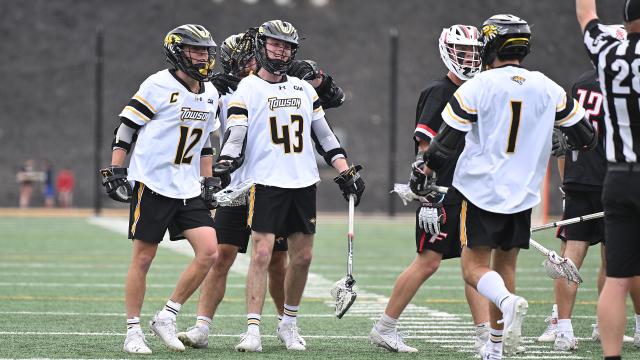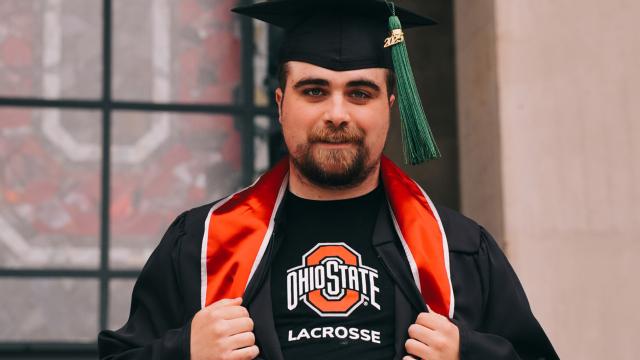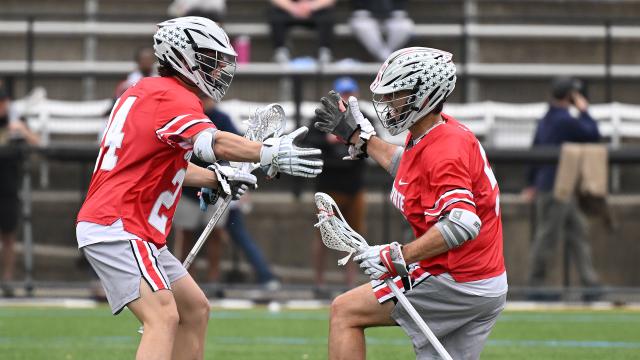03:00 PM
Apr 22



03:00 PM
Apr 22


06:00 PM
Apr 22


06:00 PM
Apr 22


11:00 AM
Apr 23


12:00 PM
Apr 23


12:00 PM
Apr 23


01:00 PM
Apr 23


02:00 PM
Apr 23


03:00 PM
Apr 23


03:00 PM
Apr 23


03:00 PM
Apr 23


03:00 PM
Apr 23


03:00 PM
Apr 23


04:00 PM
Apr 23


04:00 PM
Apr 23


04:00 PM
Apr 23


04:00 PM
Apr 23


05:00 PM
Apr 23


05:00 PM
Apr 23


05:00 PM
Apr 23


06:00 PM
Apr 23


06:00 PM
Apr 23


06:00 PM
Apr 23


07:30 PM
Apr 23


08:00 PM
Apr 23


01:00 PM
Apr 24


04:30 PM
Apr 24


05:00 PM
Apr 24


© 2025 USA Lacrosse. All Rights Reserved.

Concordia’s Brett Masaki was diagnosed with lymphoma on March 23, five weeks after he was named the MCLA Division I Warrior Player of the Week.
“No one’s ready for this moment,” Golden Eagles head coach Jesse Foss said. “But he’s in a good place to get through this mentally and physically.”
Foss and his team jumped to support Masaki, the graduate midfielder and two-time captain. Even without knowing Masaki’s treatment plan, the team began shaving their heads the day after his diagnosis. The coaches followed suit. The entire team showed their new buzzcuts when they removed their helmets under the lights following 10th-ranked Concordia’s 22-8 win over USC on Wednesday night in their first game together since his diagnosis.
“It was the nicest thing I’ve ever seen anybody do for me,” Masaki said. “Them not even caring if I’d be bald or not, they said, ‘We’re going to do it for you out of solidarity.’ It’s a crazy thing. I’m so thankful for my coaches, family, friends and even the HEADstrong Foundation has reached out to me. The support I’ve had through this, it’s monumental. It’s crazy to think about how close knit the lacrosse community is.”
Tyler Schweikert, who lived and played with Masaki before serving this year as a graduate assistant, started a GoFundMe that has raised more than $20,000 to help with medical costs and more, like Masaki’s parents moving closer so he can make it to appointments and school.
“Everything is so scrambled around,” Masaki said. “You never know what’s going to change. It was such a curveball.”
Masaki, an MCLA Scholar Athlete honoree last year who has fallen behind in school but is only weeks away from earning his MBA, began experiencing small issues with his vision six months ago, and the problems grew more acute as the spring season went on. His peripheral vision reduced to 5 percent, and Masaki struggled with the effects in a game March 7 against South Carolina.
“I had a couple problems last month of seeing the ball, but I was still able to play and kind of compensate for it,” Masaki said. “Then we played South Carolina, which was when I realized it was a big problem. I told Foss, ‘I can’t see the ball anymore,’ after the first half. I still tried to play through it, but people would pass me the ball and if it was on my left side, I just wouldn’t see it.”
Masaki, a gym rat, also felt more tired than usual and couldn’t sustain his energy. Coaches and family worried that it was stress related or possibly a cardiac problem. After a battery of tests didn’t come up with anything, and vision tests showed he could still see 20/20, the reduced peripheral vision clued doctors to schedule an MRI that showed a mass on the right side of his brain. Surgery was performed promptly to test the tissue, which proved to be cancerous.
“From the start of the season, it’s been emotional, and then obviously I got diagnosed,” Masaki said. “Instead of it being a letdown to me, it was almost more of a relief that I know what’s going on, and I’m getting some answers finally after going through this for three or four months. So, emotionally, I’m in a good spot right now. I know what’s going on. The doctor said it’s curable and treatable. I’m just trying to continue daily activities, keeping busy, going to practices. I’m coaching. I’m not playing right now. I’m trying to help the team as much as I can right now emotionally.”
Masaki is still awaiting final determination of whether he has Hodgkin lymphoma (HL) or non-Hodgkin lymphoma (NHL). For people under 45 years old at diagnosis, the HL rate of survival is 95.1 percent, and the NHL rate of survival is 84.7 percent, according to the Leukemia and Lymphoma Society. Last Thursday, doctors told him that he will undergo a course of chemotherapy in April before they reevaluate further treatment options, but Masaki is trying to live as normally as possible. Anti-inflammatories and steroids are combating some of the swelling in his brain.
“I’ve been at practice everyday coaching, trying to catch and throw the ball a little bit,” he said. “I trust my team enough that I probably don’t need to be coaching them, but they’re all supportive of me being there and they want me there. I personally want to be there and show support back. No matter what I’m going through, I’m going to be here for each and every one of them every step along the way. My goal right now is to help out, be there every game and every practice, and do as much as I can.”
Masaki already feels like he has taken a lot from lacrosse. He started playing in third grade in San Diego before joining the Poway youth program. He played for Poway High School — so did his older sister, Sydney, who now serves as an assistant coach at Cathedral Catholic. After two years of community college, he came to Concordia, where he thrived under the coaching and direction of Foss.
“He’s done a lot for me, how I am mindset wise, positivity wise,” Masaki said. “He’s had a huge impact. When I got recruited here, I wasn’t as positive as I was. He’s shaped me as a player, and he’s helped me grow as a man and take a better outlook on everything outside of lacrosse and what’s truly important on that side.”
Masaki would like to finish his college career playing for the Golden Eagles. Concordia has won six of its last seven games heading into a challenging back-to-back at No. 3 Virginia Tech on Thursday and at No. 1 Liberty on Friday. This is the final club season for Concordia, which will move up to NCAA Division II and play in the Rocky Mountain Athletic Conference as an associate member next year.
“Chemo is a pretty gnarly treatment, but I have heard stories of people still being active and being able to play,” Masaki said. “This is most likely going to be my last year. Playing or not, I’m going to take it as a positive outlook. I think everything happens for a reason. If I can play, and the doctors let me, I’m planning on playing. If that means playing as in sitting the bench, if it means playing man-up every once in a while, or taking two possessions a game, I’ll take anything to play the game of lacrosse here. It’s very important to me.”
Masaki has nine goals and five assists on the season. He had three goals and an assist as Concordia upset then-No. 3 BYU 18-10 to earn Player of the Week honors. Last year, he was an honorable mention all-conference selection after scoring 25 goals with 13 assists. Both were career highs.
“He’s been a tremendous player for us,” Foss said. “He’s been a three-year starter. It’s his fourth year in the program. He’s been a two-time captain. His play in the field has been great. His leadership off the field, his ability to get through to some of the tough guys and lead, that’s probably where his value has been even greater.”
Whether he is on the field, or on the sidelines, Masaki has been able to help the Golden Eagles. And that hasn’t changed since his lymphoma diagnosis. He’s inspired his teammates and coaches.
“They see a 24-year-old going through this, it’s gotta be very scary,” Foss said. “The strength he’s showed us, it gives me strength to get through stuff, and I think it shows the team this is something we can learn from. I think they’re all handling it very well.”
Masaki has gathered strength from his program’s support and the support of the lacrosse community as he prepares for treatment ahead. Masaki is staying in shape for a return to play. He went for a run just five days after doctors drilled a dime-sized hole in his head to take tissue samples. He isn’t passing up any chances.
“I’ve already gained so much wisdom and knowledge on life and true perspective,” Masaki said. “I’m really focusing on important things in life besides what some people think is important. I wake up every morning in probably the best mood I’ve ever had in 24 years. To walk outside and go on a run, two weeks ago when I’d go on a run, I always hated it. Now I’m just happy that my feet are working, and I can go on a run and I get to help kids play lacrosse, I get to coach, I get to hang out with my friends on the field. That stuff’s truly important to me, I realized now.”
Justin Feil grew up in Central PA before lacrosse arrived. He was introduced to the game while covering Bill Tierney and Chris Sailer’s Princeton teams. Feil enjoys writing for several publications, coaching and running and has completed 23 straight Boston Marathons. Feil has contributed to USA Lacrosse Magazine since 2009 and edits the national high school rankings.




